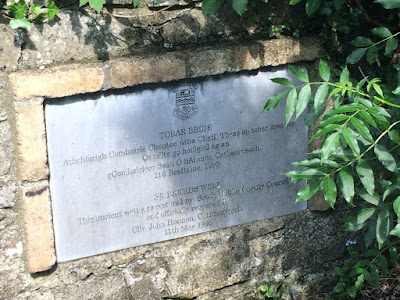Our campground, the Camac Valley Camping and Caravanning Park, was located very near the south Dublin suburb of Clondalkin. While Clondalkin appeared nice enough a place, prosperous-looking here and there, a big shopping center, it was the older stuff that interested me, so on an administrative day walk, I ventured into town to see the Clondalkin Round Tower and St. Brigid's Well. Both have pretty well stood the test of time.
 |
The Clondalkin Round Tower; one sees these
all around Ireland, always at abbeys, generally
12th century; said to have housed relics: more
likely to have defended relics during visits of
brigands...; most approaching 100 ft high;
Clondalkin among the largest and best
preserved |
 |
| Closer up |
 |
Of equal interest was St. Brigid's Well; St. Brigid was a Druid
personage who converted to Christianity and proceeded to live
a life of such holiness as to become a saint, indeed Ireland's
patron saint (along with St. Patrick); details are somewhat
lacking...we're talking 5th century here; she was named after
the Celtic goddess Brid, goddess of fire, one of the Celtic
pantheon St. P couldn't replace with some Christian figure;
anyway, legends abound about St. Brigid; allegedly, our term
"bride" comes from the Celtic goddess... |
 |
There it is, just behind the large potted shrubbery; probably so
protected to keep it from being profaned (it is just feet from a
busy thoroughfare); "bring us a shrubbery" |
 |
One of the more lavishly decorated local sites I have seen; note
gnomes; according to lore, St. B stopped on her holy travels; if
you dip your hankie in the well water and hang it on the tree
three days, then wipe your eyes with it, you'll be cured of any
eye-sight problems; right... |
 |
In addition to being (a) patron saint for the island, St. B is also
patron saint for "bakers, blacksmiths, boatmen, cattle, chicken
farmers, children whose parents are not married, dairymaids,
dairy workers, fugitives, infants, Ireland, Leinster [one of
Ireland's five historic regions], mariners, midwives, milk maids,
poultry raisers, printing presses, sailors, scholars, travellers,
watermen, Creativity, Scholars, Poets"; busy lady |




No comments:
Post a Comment